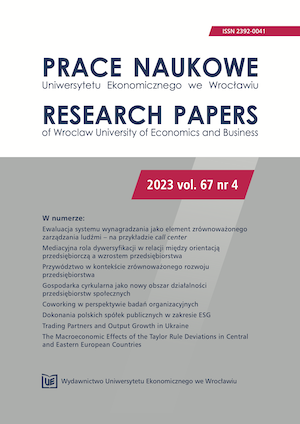Determinants of the Transformation of Linear Business Models Towards a Circular Orientation
Determinanty transformacji linearnych modeli biznesu w stronę orientacji cyrkularnej
Author(s): Adam Jabłoński, Marek JabłońskiSubject(s): Business Economy / Management
Published by: Wydawnictwo Uniwersytetu Ekonomicznego we Wrocławiu
Keywords: linear business model; circular business model; climate change; digital business model; artificial intelligence; green scalability
Summary/Abstract: Abstract: The article aims to explain the determinants of the transformation of linear business models in the circular direction against the background of modern digital technologies. The article takes into account the conditions of green scalability to create pro-ecological processes of circular production, logistics processes, and service provision supported by digital economy solutions that are resistant to unforeseen events. Research methodology: The literature on the subject was reviewed and the theoretical and practical implications related to the specificity of the transformation of linear business models in the circular direction were indicated. Results: Based on the literature review, and the authors’ observations and analyzes, the scientific problem was identified, which is to indicate the assumptions that the circular economy initiates and stimulates the emergence of new business models supported by digital economy solutions. Since the starting point is the achievement of ambitious goals in the area of ecological efficiency, circular business models should be based on the assumptions of the digital economy. Today’s susceptibility of businesses to the absorption of digital solutions is high. The factors of the need to control the volatility of production processes and reduce the negative impact on the natural environment while dynamically triggering the ability to build innovation create new spaces for creating added value. Many managers are aware that their linear business models are doomed to failure in the digital world, so they try to find ways to achieve rapid to digitalization. In the case of circular business models, the dynamics of change must be even greater, because in this situation we are also dealing with a complete reconfiguration of business models. Originality/value: Indication in the application of the proprietary methodology of the seven-stage cycle of the transformation process of the linear business model to meet the assumptions of the circular business model. Defining the assumptions of green scalability of digitally supported circular business models.
Journal: Prace Naukowe Uniwersytetu Ekonomicznego we Wrocławiu
- Issue Year: 67/2023
- Issue No: 4
- Page Range: 83-96
- Page Count: 14
- Language: Polish

